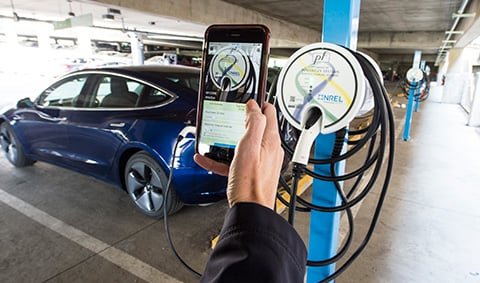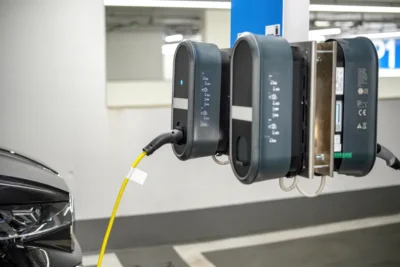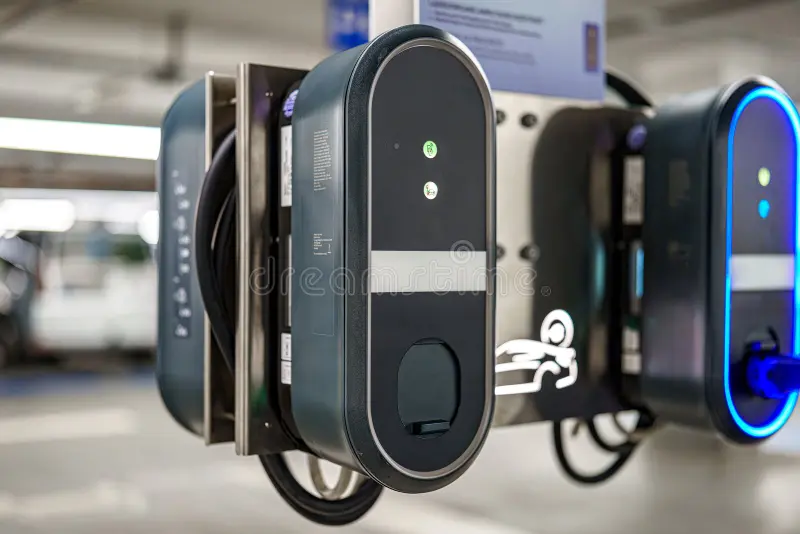What Are Smart EV Charging Stations and Why They Matter
Electric vehicles (EVs) are becoming more common every year. As more people switch from gas to electric, we need better ways to charge these cars. Smart EV charging stations are a modern solution to this growing need. They are not just simple plugs for your car—they use smart technology to charge vehicles in better, faster, and more efficient ways. In this blog post, we will explain what smart EV charging stations are, how they work, their benefits, and how they support the future of clean energy.
What Is a Smart EV Charging Station?
A smart EV charging station is a device that charges electric vehicles but with advanced features. Unlike basic chargers that just deliver electricity, smart chargers use technology to make charging more flexible and efficient.
Regular vs. Smart Chargers
Regular EV chargers work like simple power outlets. You plug in your car, and it charges without any control or feedback. On the other hand, smart chargers are connected to the internet. They allow users to monitor and control the charging process using apps or web platforms. These chargers can talk to the power grid, your car, and even your smartphone.
Key Features of Smart Chargers
-
Wi-Fi or Bluetooth connectivity
-
Charging schedule setup
-
Energy usage tracking
-
Remote start and stop options
-
Integration with renewable energy systems
These features make smart chargers more useful for EV owners and help reduce electricity waste.
How Smart Charging Works

Smart charging works by using software to manage when and how your EV is charged. This helps balance energy use and saves money.
Internet Connection
Most smart EV chargers connect to the internet. This allows them to receive updates and communicate with apps or cloud-based systems. This connection helps the charger make smart decisions based on your settings and the energy market.
Use of Mobile Apps
Users can control the charger through a smartphone app. This app lets you set charging times, check battery levels, and get reports on energy use. You can also stop or start charging from anywhere.
Adjusting Power Levels
Smart chargers can also adjust the power level sent to the car. If electricity is expensive during peak hours, the charger can reduce the speed or delay charging until rates go down. This helps lower your energy bill and eases stress on the electric grid.
Benefits of Smart EV Charging Stations
There are many reasons to choose a smart charging station over a regular one. Here are some key benefits.
Save Money on Electricity
Smart chargers can charge your EV when electricity is cheaper. Many power companies have time-of-use pricing. This means power is cheaper late at night or early in the morning. A smart charger can be set to charge only during these times, helping you save money.
Reduce Grid Load
Electric grids are under pressure, especially during hot days or busy times. Smart chargers can avoid these peak hours. They can slow down or pause charging when demand is high and restart when things calm down. This helps protect the power grid and avoid blackouts.
Easy Monitoring and Control
With smart chargers, you always know how much electricity you’re using. You can track charging sessions, set limits, and get alerts on your phone. This gives you more control and helps you understand your energy habits.
Better for the Environment
Smart charging makes better use of clean energy. Some systems can be set to only use solar or wind power when available. This reduces your carbon footprint and supports a cleaner planet.
Future-Ready Features
Some smart chargers offer new features like vehicle-to-grid (V2G), where your car battery can give energy back to the grid. While not common yet, these features are part of the future of EV charging.
Smart Charging at Home vs. Public Charging

Smart EV chargers are available both for home use and in public places like shopping centers, parking lots, and offices. There are some differences between the two.
Home Charging
At home, smart chargers give you full control. You can schedule charging at night, track energy use, and integrate it with your home solar system if you have one. It’s also convenient because your car charges while you sleep.
Public Charging
Public smart chargers may not offer as much control. However, they are useful when you’re on the go. Some stations allow app-based payments, show you availability in real time, and even offer fast-charging options. They’re perfect for long trips or when you don’t have home charging access.
Pros and Cons
| Type | Pros | Cons |
|---|---|---|
| Home | Full control, cost-effective | Requires installation |
| Public | Convenient, fast | May cost more, less control |
Role in Renewable Energy and the Smart Grid
Smart EV chargers play an important role in clean energy systems. They can help use more solar and wind energy and make the power grid more flexible.
Matching Energy Supply
Renewable energy sources like solar and wind are not always available. Smart chargers can be set to charge your EV when these sources are active. For example, if the sun is shining during the day, the charger can use that clean energy directly.
Building the Smart Grid
The future of electricity is moving toward a “smart grid.” This is a power system that uses data and automation to deliver electricity more efficiently. Smart chargers are part of this system. They can talk to the grid, delay charging if there is high demand, or even return power back in some advanced setups.
Future of Smart EV Charging
As the number of electric vehicles grows, smart charging will become even more important. The technology behind smart chargers will also keep improving.
More EVs, More Demand
By 2030, millions more EVs will be on the road. Smart charging helps manage this demand without overloading the grid. It ensures that energy use is spread out over time, making the system stable and reliable.
New Features Coming
Future smart chargers may include features like:
-
AI-based charging decisions
-
Vehicle-to-home energy use
-
Integration with smart home systems
These changes will make EV charging easier, cleaner, and more connected to our everyday lives.
Conclusion
Smart EV charging stations are more than just outlets for your electric car. They are powerful tools that help save money, protect the power grid, and support clean energy. With smart features like scheduling, remote control, and data tracking, they offer many benefits over regular chargers. Whether you’re charging at home or on the road, smart chargers make the process simple and efficient. As electric cars become more common, smart charging will play a key role in building a cleaner and smarter future.

